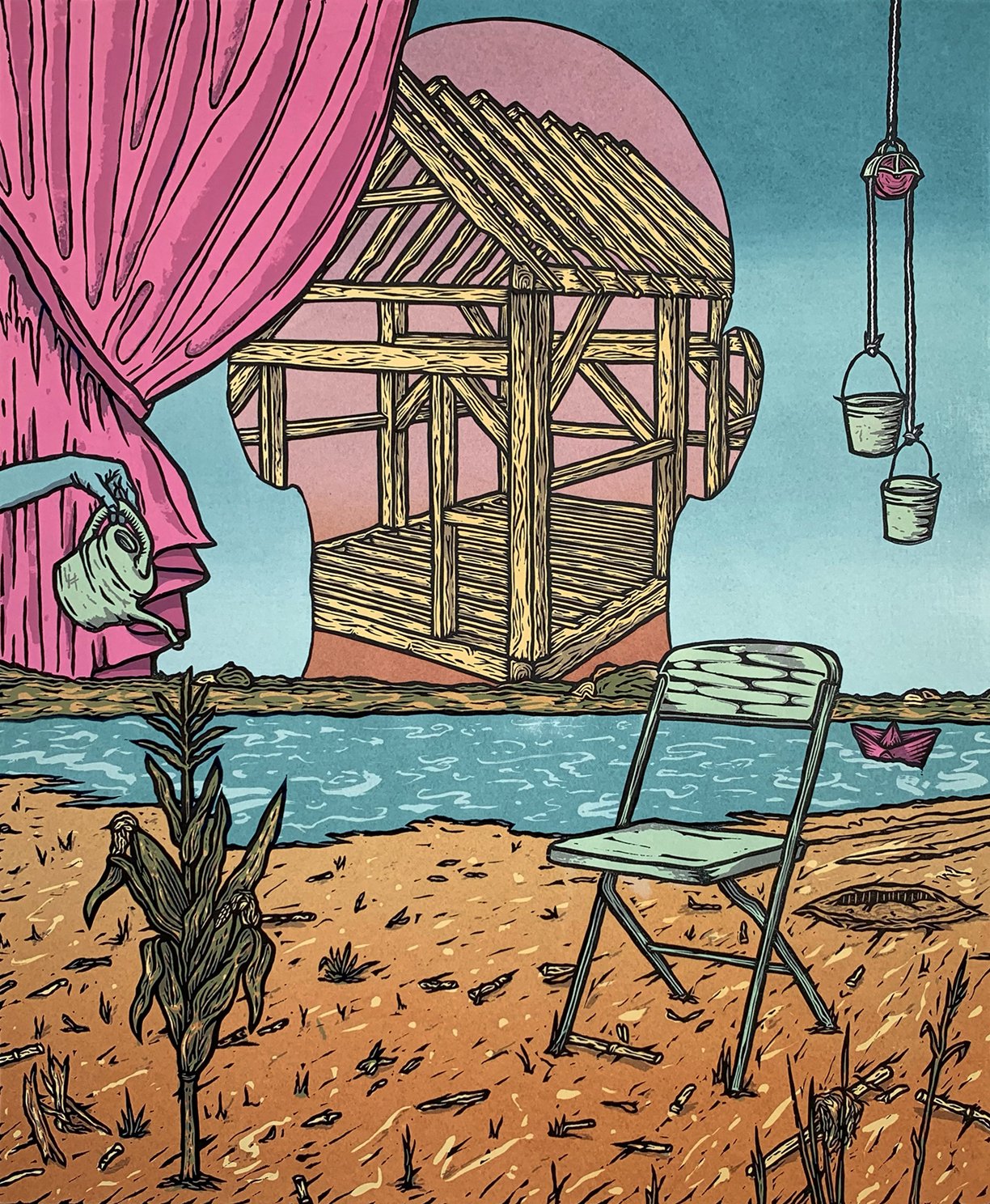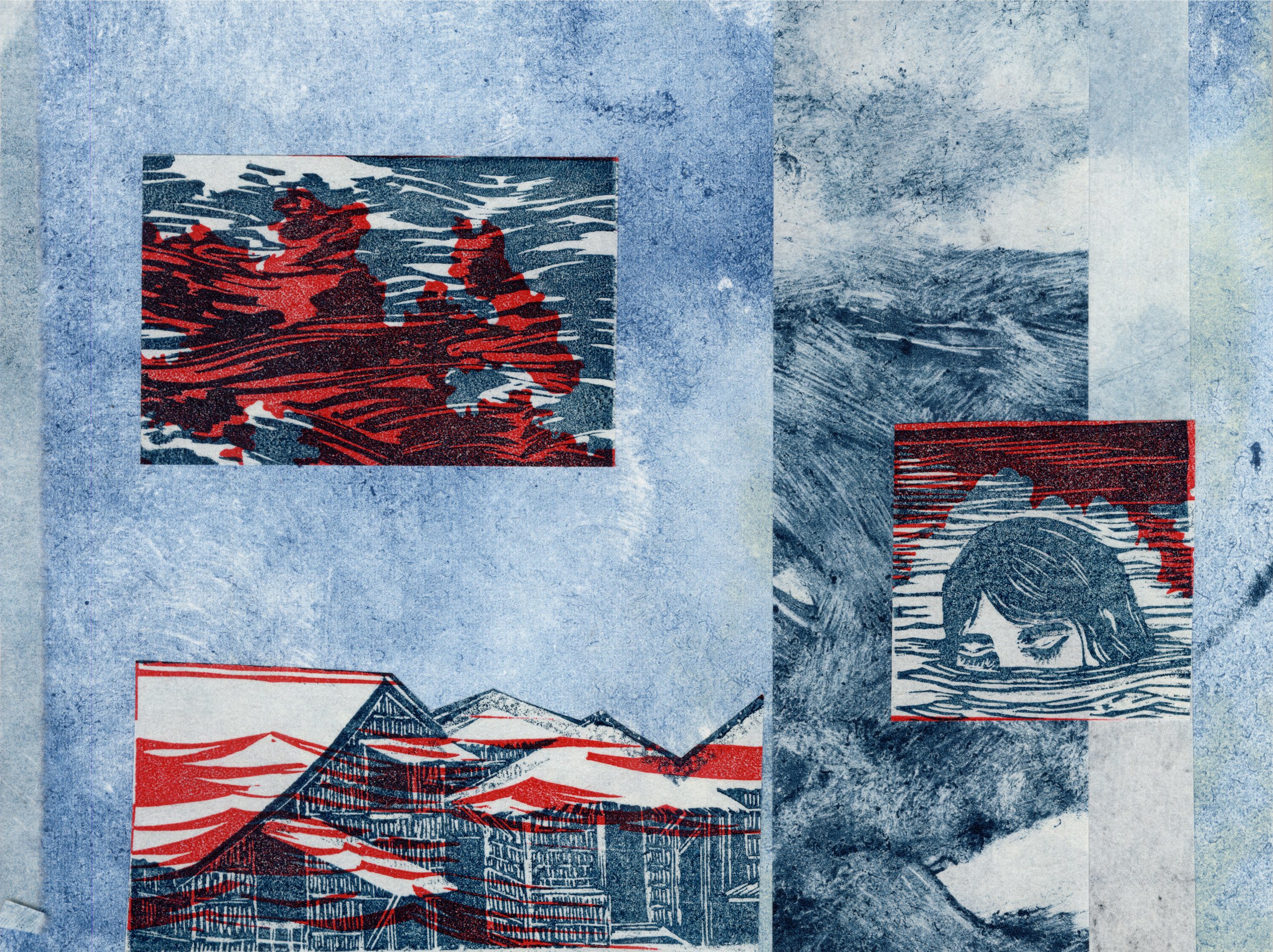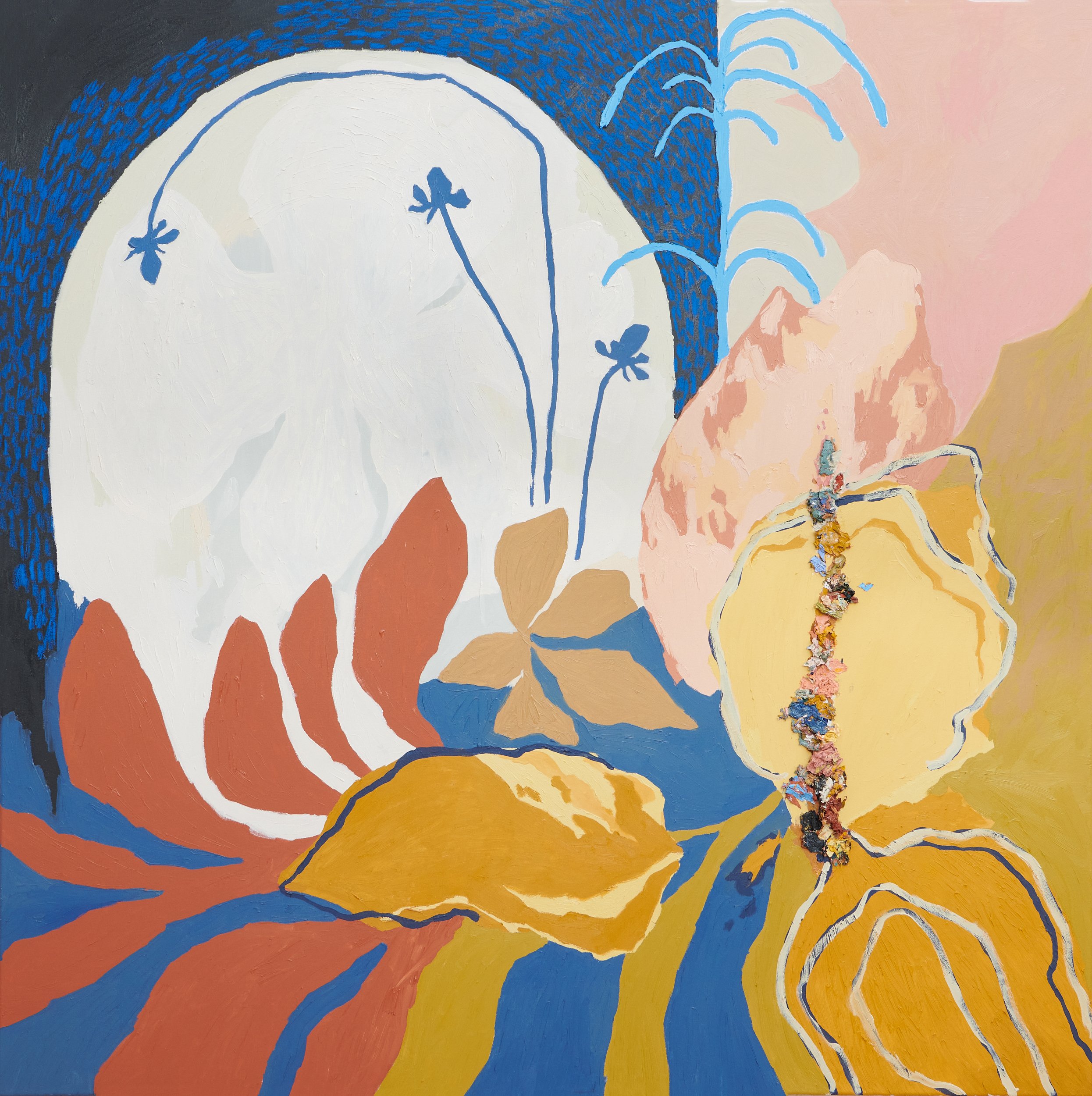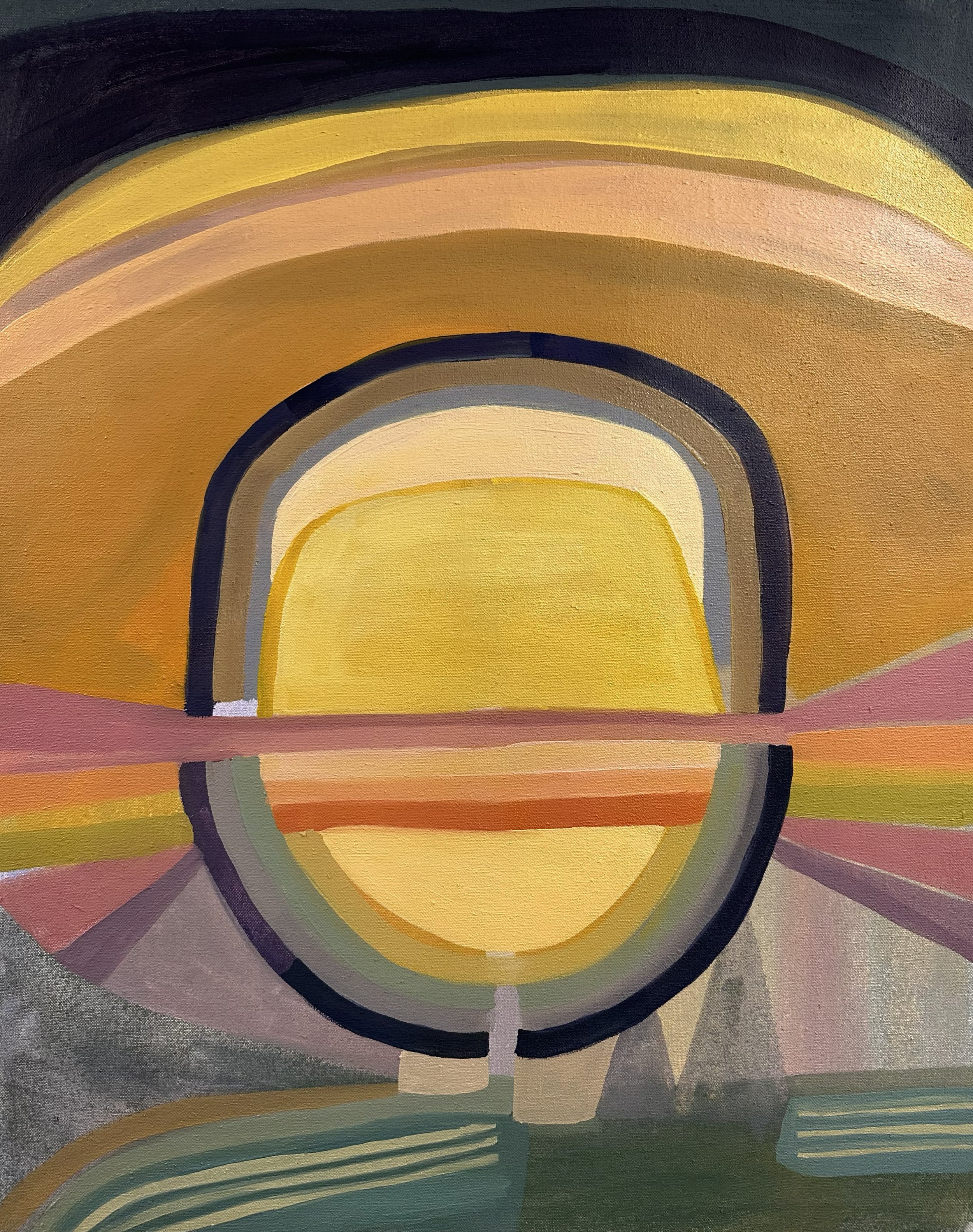ROY Presents: Dustin Brinkman & Gloria Shows | Lyric Morris-Latchaw & Casey Dressell
ROY asks
Dustin Brinkman & Gloria Shows
What is your name and what pronouns do you use?
Dustin Brinkman, He/Him/His
How has art (whether it be your own or art in general) changed you?
My practice of art making has greatly impacted my perception of the world around me. Through the lens of printmaking my process is slowed, just like my time spent observing spaces, people, and landscapes. I take time to look, placing even the smallest moments or ideals under a microscope, picking them apart until I reach their core. For myself, art goes beyond just making, it is a part of the spirit no different than needing to take a breath or feel the sun. Art has given me a vocabulary and way of processing my thoughts surrounding my homelife, the Midwest, and the other structures I spend time in.
How did you start your artistic practice?
Printmaking was something I sort of stumbled into in the fall of 2013. I began taking print classes in undergrad and fell in love with the craft. I felt something through the act of carving blocks, it moved me and made me feel like I was finally able to express all the thoughts and visions in my head that had been so hard to put words to. I swear there’s nothing like sitting down to carve a relief block for hours and hours that has given me more joy and comfort. My most recent body of work has stemmed from the philosophies of giving agency to spaces and homes, how we define interior and exterior, and where we make roots in an ever-changing landscape.
When a first-time viewer sees your work, what is the first word that you hope they think of when looking at it?
When someone views my work for the first time, I hope they feel the complexity within layers. As their eyes pass from frame to frame, I hope the first word or phrase they conjure is the intricate tethers within space.
What is your name and what pronouns do you use?
My name is Gloria Ann Shows and my pronouns are she/her/hers.
How has art (whether it be your own or art in general) changed you?
Art in my childhood took the form of cartoons, video games, and the folklore of my host country. With my art education and eventual studies in printmaking I slowed down and looked back to my formative relationship to visual culture which extended to landscapes, both natural and constructed. The consistent and structured environment helped me dedicate time and develop a visual language around my relationship to place. In some ways making has been an escapist fantasy, and this has changed my relationship to other modes of escapism.
How did you start your artistic practice?
When I was a child drawing with crayons on copy paper, my dad would remark on how exciting it was to have another artist in the family. This made me feel connected to a family that was far away, more specifically to my paternal grandmother who I had met once before and a handful of times ever since. In an applied sense, I was resistant to studying art and I thought for a while that I might go into psychology or graphic design. My studies in psychology translated into drawings and paintings in my spare time and I eventually fell in love with printmaking as another way to connect deeply with my inner world. Printmaking methods have become especially meaningful to me. I processed my uncovering of personal history, ethnic identity, and cultural identity through the mirroring, carving, and impressions made from wood, linoleum, and plexiglass.
When a first-time viewer sees your work, what is the first word that you hope they think of when looking at it?
I often hope the viewer will feel something with each viewing and that they treat each frame as an entryway to a web of stories. Ohio-based artist John Thrasher shared with me that a word that came to mind was “wistful” and I was grateful for that.
ROY asks
Lyric Morris-Latchaw & Casey Dressell
What is your name and what pronouns do you use?
Lyric Morris-Latchaw, she/her
How has art (whether it be your own or art in general) changed you?
Creating art has given me a way to synthesize all of my experiences, research, and imaginations into something that I can offer back to the world and my community. I love thinking about the idea that each human on this planet has a one-of-a-kind experience and lens, and because of that there is art that only we could make. If you don't make your art, no one else will!
How did you start your artistic practice?
I have made art since I was a kid, but started creating more seriously in college in 2011. While I was studying, I mostly focused on printmaking and ceramics. After school, I moved to a new city (Cincinnati), and had very little money to pay for renting the studio time/equipment necessary to work in those mediums, so I started painting because I could do it relatively cheaply in the corner of my apartment. I quickly fell in love, and the rest is history.
When a first-time viewer sees your work, what is the first word that you hope they think of when looking at it?
I hope that the word viewers think of is "hopeful". The climate crisis has caused so much irreparable harm and loss, and yet I think that our path forward is to dream up the possibilities of new, imaginative futures in the face of this devastation. I have hope that there's a nuanced way to do this that doesn't negate or ignore the harm caused, but engages with and transforms it into forward-looking energy. My paintings are representations of this fecund, imaginative, bright future that I hope in.
What is your name and what pronouns do you use?
Casey Dressell
How has art (whether it be your own or art in general) changed you?
During challenging personal times, I found making or looking at art helped me focus on the present moment and forget (for a short time) what was happening around me. At times, I didn’t think I had the confidence to put my art out into the world, teach others, start an art business, or work with other artists that have been working professionally much longer than I. I grew confidence as I took on more responsibilities and as I saw myself achieving things I didn’t think I could before.
How did you start your artistic practice?
I started my artistic practice as a positive coping mechanism for challenges I was experiencing in my life.
When a first-time viewer sees your work, what is the first word that you hope they think of when looking at it?
The first word I hope viewers think of when they see my work for the first time is joy.




